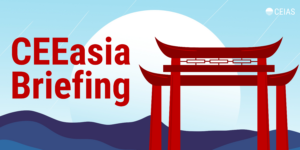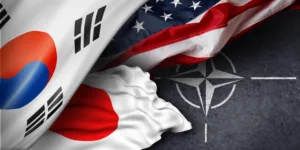In order to avoid escalation from happening the EU needs to start preparations — including a sanctions package — on all possible escalation scenarios, including the least possible, but still probable case of invasion on Taiwan.
Escalation can take on many forms and doesn’t mean only a full-scale Chinese’s invasion of Taiwan. A military takeover of the island remains probable, for sure, but it is contingent on a long-term perspective and subject to fulfillment of several factors, such as the future of China’s military development or the PRC’s economic situation, with outcomes impossible to predict.
An “escalation ladder” involves many steps, which might happen one after another, and it provides the EU with clues and confirmations of China’s escalation process. The first phase includes the intensification of hybrid actions, which are currently ongoing. That includes disinformation attempts to undermine the possibility of Taiwan’s defense, or cyberattacks against critical infrastructure and information domains.
Afterwards, China would probably expand military maneuvers and exercises, such as crossing the “median line” or violating Taiwan’s airspace. In parallel would be the use of economic pressures, such as embargoes on certain products from Taiwan or even a full island trade blockade.
The third phase leading to a possible invasion and the pressuring of Taiwan for political concessions involves multiplication of production, purchase, and storage of ammunition and military equipment; development of military infrastructure; suspension of demobilization of soldiers; and gathering food supplies. All these stages would require the EU to react in different ways.
Why should the EU react?
Just as in the case of Russia’s invasion of Ukraine, a failure to react to China’s escalation would undermine the basic ideas that led to the establishment of the European Union, and which are responsible for the EU’s strong level of integration. The escalation process with probable invasion at the end (a blockade or occupation of several, smaller Taiwanese islands, for instance) has the capacity to morph into a global conflict with greater repercussions for the EU compared to those originating from Russia’s invasion on Ukraine. Taiwan’s importance in the semiconductors sector (and various production chains in the region connecting Taiwan, China, South Korea, Indonesia, but also Netherlands or the US) means that any serious disturbances of these chains would have disastrous effects on EU economies, as well as the standard of life in Europe’s well-off societies. Such a failure to react to China’s escalation (invasion included) would also undermine EU relations with the US (which is crucial from the point of European security) and reduce the probability that the EU can become a globally important political entity, especially within the ASEAN community and the Global South.
What are the EU’s goals?
Levels and instruments of reaction would vary according to perspectives of escalation (with hybrid tactics already happening) but there are four main goals for the EU to achieve. First and foremost is prevention of escalation, either armed invasion, occupation of Taiwanese islands or economic blockade. That requires an in-depth review of relations with China, the second imperative for the EU. Third is the reduction of long-term interdependence with China but while maintaining the possibility to pressure China through economic means. The EU’s leverage over market access is one of the solutions here, as well as growth of the base of suppliers of raw materials. This smart reduction would reduce the possibility of China coercing the EU not to react in case of escalation. And the fourth goal is to prepare political, economic and especially sanctions mechanisms in case of the worst scenario: China’s military invasion of Taiwan. There is a need to debate this now, especially as the US pushes the EU to consider sanctioning Chinese companies for delivering dual-use products to Russia, as well as very likely military cargoes.
What are the possible and reasonable reactions?
Among the goals mentioned above, there are many instruments that could be adopted to prepare for China’s escalation, and to slow or stop that escalation process. However, successful implementation of these instruments will not be an easy process and requires communication and collaboration from many entities with different backgrounds, political agendas, and personal views, such as the business community, EU institutions (with their own diversified agendas), member states, and Union’s partners in the Indo-Pacific, as well as the US.
In the short-term, the EU already plays a limited role as a stabilizing factor in the region. It and member states cannot provide serious, influential military support on the ground but they can strengthen cooperation in the defense industry, in arms development, and in measures to counter hybrid attacks. In the long-term, supporting regional partners to extend their defense potential will provide a more solid base for security cooperation with the US in case China escalates to the most serious level.
In order to reduce the risk of the conflict, the EU should first and foremost support Taiwan in the international arena, including its inclusion in international organizations. The “One–China policy” does not prevent countries from having diplomatic contacts with Taiwanese, although countries refrain from doing so because of possible Chinese reactions. The political message (together with Indo-Pacific partners) on the EU’s readiness to respond to Chinese escalation is also needed. At the same time, improving European defense potential in order to better defend itself against Russian threats to NATO, EU member states would also influence the strategic situation in the Indo-Pacific, allowing the US to focus more on adopting its strategic plans in Asia.
In terms of reviewing relations with China, canceling the formula of “partnership, competitor, and rivalry” is needed. China’s current foreign policy presents the EU with more threats than opportunities, and dialogue (communication is important) with the Chinese government needs to be based on that analysis. Such a clarification needs to result in the acceleration of economic instruments that are either already accepted (investment screening) or in the legislative process, such as the anti-coercion mechanism or foreign-subsidies act. The implementation of these would also require a serious consideration of the decisions-making processes, with greater authority given to the European Commission.
Reducing long-term interdependence requires greater involvement of the EU in enforcement of standards in international organizations, as well as cooperation and implementation of joint economic projects with partners like the US, Australia, Canada, and Japan. Programs like the “Global Gateway” serve as good instruments in assisting the Global South and reducing the world’s dependence on China. Development of storage facilities for materials necessary for production are needed, as well as conditions facilitating and encouraging EU companies to relocate production away from China to other EU countries or regions.
Preparations for a possible future attack by China on Taiwan are limited but it is important to start their implementation as soon as possible. These require analysis, debate, and implementation of political positions in case there is an invasion, prepared not only by the EU itself but together with partners. The sanctions packages (to be prepared earlier) need to be adopted with a view to the scale and detail of the Chinese escalation. All need to be ready to implement as soon as the escalation reaches a kinetic point.






